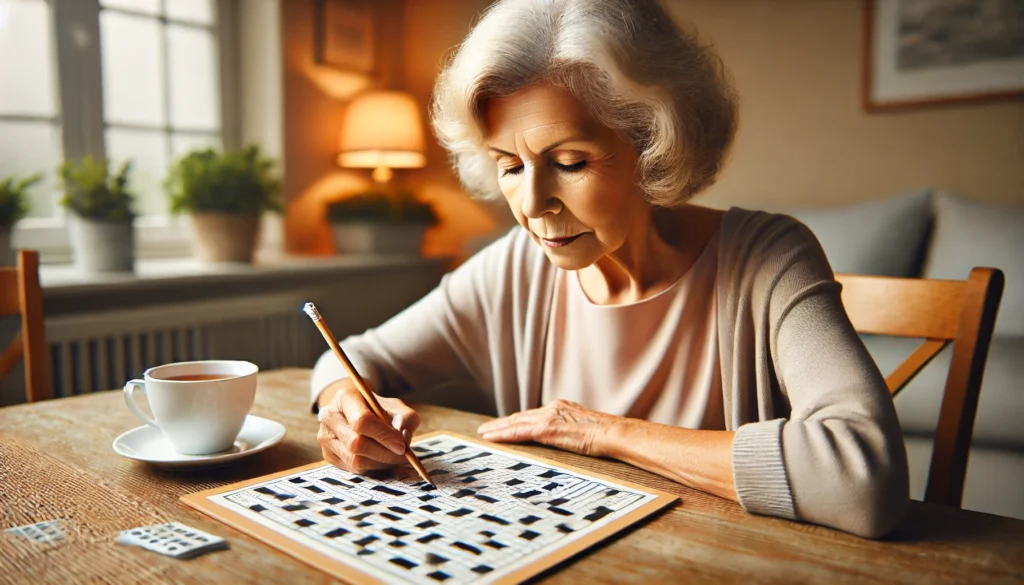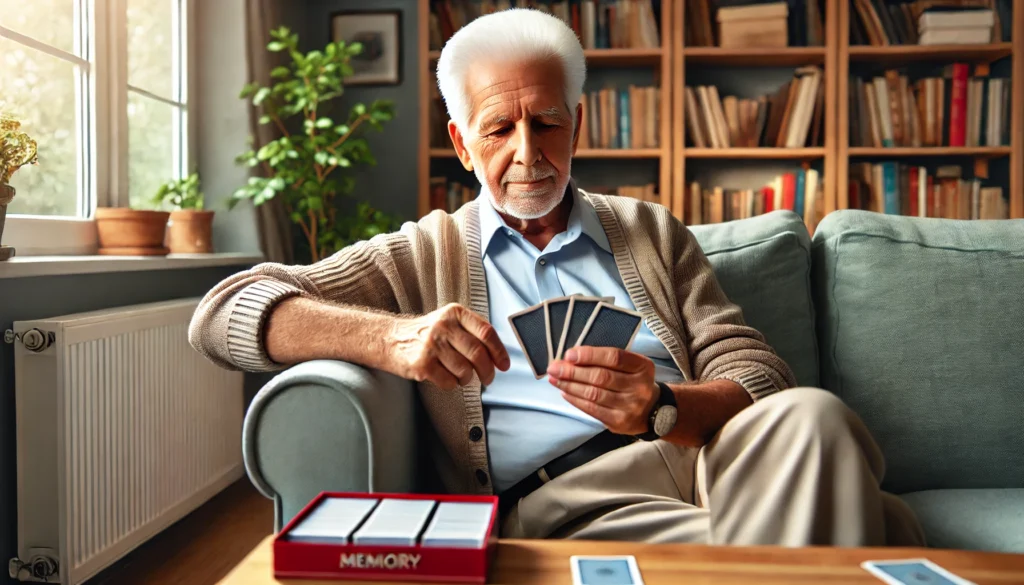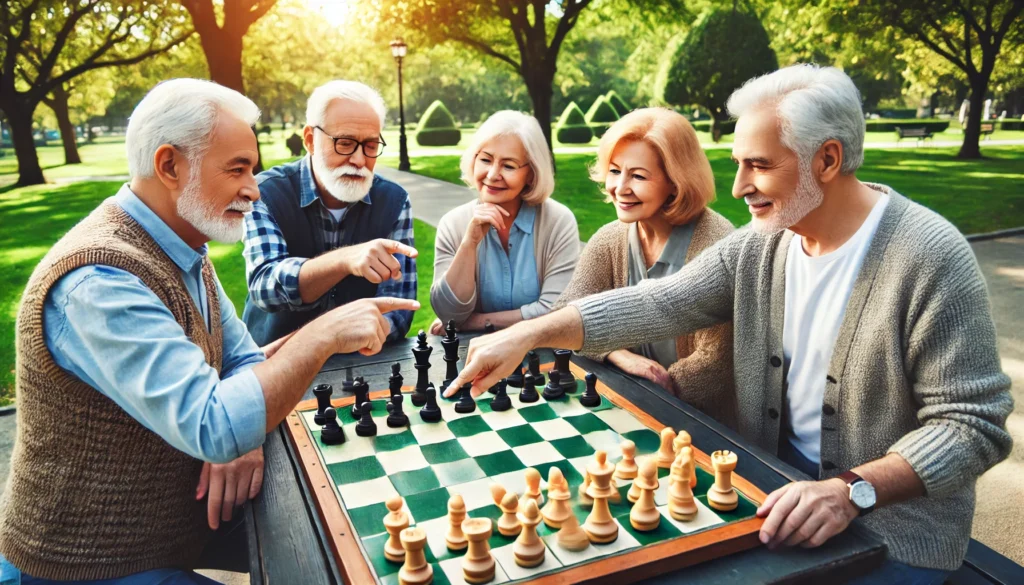As we age, maintaining cognitive health becomes increasingly vital. Engaging in brain exercises is a proven method to boost memory and cognitive functions in the elderly. The objective is to stimulate the brain through various activities, which can delay the onset of cognitive decline. In this article, we will explore the most effective brain exercises for seniors, detailing how they work and why they are beneficial.
You may also like: Boost Your Mind: Top Brain Games
The Science Behind Brain Training
Brain training exercises are designed to stimulate neuroplasticity—the brain’s ability to reorganize itself by forming new neural connections. This adaptability is crucial for maintaining cognitive functions as we age. Research indicates that engaging in regular mental exercises can enhance memory, processing speed, and problem-solving skills.
Understanding Neuroplasticity
Neuroplasticity is the brain’s remarkable ability to change and adapt in response to new experiences. This dynamic process involves creating new neural pathways and strengthening existing ones. In seniors, neuroplasticity helps compensate for age-related changes in the brain, preserving cognitive function.
Cognitive Reserve and Aging
Cognitive reserve refers to the brain’s resilience against damage. Individuals with a higher cognitive reserve can better withstand age-related decline. Brain exercises help build this reserve by continuously challenging the brain, potentially delaying the onset of cognitive disorders such as Alzheimer’s disease.
Scientific Evidence Supporting Brain Training
Numerous studies have shown that mental exercises can lead to measurable improvements in cognitive performance. Research involving seniors has demonstrated enhanced memory, attention, and problem-solving abilities following consistent brain training activities. These findings underscore the importance of mental stimulation in healthy aging.
Historical Context of Brain Exercises
The concept of brain training isn’t new. Ancient civilizations, such as the Greeks and Romans, used various mnemonic devices to improve memory. Fast forward to the 20th century, cognitive psychology introduced the idea of structured mental workouts. Today, the digital age has brought a plethora of brain training apps, making cognitive exercises more accessible than ever.
Ancient Practices for Cognitive Enhancement
Ancient Greeks and Romans employed sophisticated techniques to enhance memory and learning. Philosophers and scholars developed mnemonic systems, such as the method of loci, to aid in memorization. These early practices highlight the long-standing human interest in cognitive enhancement.

Cognitive Psychology and Brain Training
The 20th century saw the emergence of cognitive psychology, which laid the foundation for modern brain training. Psychologists began to study how mental exercises could improve cognitive functions, leading to the development of structured cognitive training programs that are still in use today.
Digital Age and Accessibility
The advent of digital technology has revolutionized brain training. A multitude of apps and online platforms offer accessible and engaging cognitive exercises for seniors. These digital tools provide personalized training programs, allowing users to track progress and adjust difficulty levels according to their needs.
Types of Brain Exercises for Seniors
Mind Games for Seniors
Mind games are an enjoyable way to enhance cognitive functions. They include puzzles, card games, and strategy games that challenge the brain. Regular participation in these activities has been shown to improve attention, memory, and processing speed.
Puzzles and Strategy Games
Puzzles such as Sudoku, crosswords, and jigsaw puzzles engage different cognitive skills, including logic, spatial reasoning, and vocabulary. Strategy games like chess and checkers demand foresight and strategic thinking, which stimulate multiple brain areas.
Card Games and Their Benefits
Card games, such as bridge and solitaire, are excellent for improving concentration and memory. They require players to recall rules, track opponents’ moves, and make strategic decisions, providing a comprehensive mental workout.
Word and Language Games
Word games, including Scrabble and word search puzzles, enhance linguistic abilities and vocabulary. These games encourage players to think creatively and expand their language skills, which can have a positive impact on communication abilities.
Puzzle Games for Elderly
Puzzles are excellent tools for maintaining mental acuity. Jigsaw puzzles, Sudoku, and crosswords stimulate various cognitive processes, including spatial reasoning and vocabulary. They require critical thinking, which strengthens neural pathways and enhances memory retention.
Jigsaw Puzzles and Spatial Skills
Jigsaw puzzles challenge spatial awareness and problem-solving abilities. Completing a puzzle requires recognizing patterns, visualizing the completed picture, and strategically placing pieces, all of which engage and strengthen the brain.
Sudoku and Logical Reasoning
Sudoku puzzles are excellent for improving logical reasoning and number skills. Solving these puzzles involves analyzing numerical patterns and sequences, enhancing cognitive processes related to logic and critical thinking.
Crosswords and Vocabulary Building
Crossword puzzles stimulate the brain’s language centers and enhance vocabulary. These puzzles encourage lateral thinking, as players must decipher clues and find words that fit specific patterns, fostering mental agility.
Memory Games for Elderly
Memory games, like matching pairs or Simon Says, are specifically designed to improve short-term memory and concentration. These games often involve recalling sequences or matching items, which helps to exercise the brain’s memory centers.
Matching Pairs and Concentration
Matching pairs games, where players flip cards to find matching images, enhance memory and concentration. These games require players to remember the location of cards and improve their ability to focus on tasks.
Simon Says and Sequential Memory
Simon Says games involve recalling and repeating sequences of colors or sounds. These exercises improve sequential memory and attention, helping seniors to maintain focus and strengthen memory retention.
Digital Memory Games
Digital platforms offer a variety of memory games that can be played on tablets or smartphones. These interactive games provide engaging ways to challenge memory and cognitive skills, with the added benefit of tracking progress.
Cognitive Games for Seniors
Cognitive games focus on improving specific mental skills such as logic, problem-solving, and decision-making. Chess, for instance, requires strategic planning and foresight, engaging multiple areas of the brain simultaneously.
Chess and Strategic Thinking
Chess is a classic cognitive game that enhances strategic thinking and foresight. Players must anticipate opponents’ moves, plan strategies, and adapt to changing game dynamics, all of which stimulate cognitive flexibility and problem-solving skills.
Logic Puzzles and Critical Thinking
Logic puzzles, such as riddles and brain teasers, challenge critical thinking and problem-solving abilities. Solving these puzzles requires analyzing complex information, identifying patterns, and formulating solutions.
Decision-Making Games
Decision-making games, like role-playing games, encourage players to make choices and evaluate outcomes. These games improve decision-making skills and adaptability, which are vital for navigating real-life situations.
Brain Teasers for Seniors
Brain teasers are riddles or puzzles that require thinking outside the box. They challenge the brain to approach problems from different angles, fostering creativity and mental flexibility.
Lateral Thinking Puzzles
Lateral thinking puzzles encourage creative problem-solving by presenting unconventional challenges. These puzzles require players to think outside the box and explore innovative solutions, enhancing cognitive flexibility.
Math and Number Teasers
Math and number teasers challenge numerical reasoning and mental arithmetic. Solving these puzzles requires quick calculations and logical deductions, improving mathematical skills and cognitive agility.
Visual and Spatial Challenges
Visual brain teasers, such as optical illusions and spatial puzzles, engage the brain’s visual processing centers. These challenges enhance spatial awareness and visual perception, contributing to overall cognitive fitness.
Benefits of Brain Training for the Elderly
Enhanced Memory and Recall
Regular mental exercises improve memory retention by reinforcing neural connections. This enhanced recall ability helps seniors remember names, dates, and daily tasks more efficiently.
Strengthening Neural Pathways
Brain exercises reinforce neural pathways, making them more efficient at transmitting information. This strengthening process improves memory retention, allowing seniors to recall information more accurately and quickly.
Short-term and Long-term Memory
Engaging in memory exercises benefits both short-term and long-term memory. By practicing recall and retention techniques, seniors can enhance their ability to remember recent events and past experiences.
Everyday Memory Improvements
Improved memory and recall can enhance daily life, making it easier for seniors to manage appointments, remember conversations, and perform routine tasks without relying on external reminders.
Improved Problem-Solving Skills
Brain exercises that involve complex puzzles or strategic games enhance problem-solving skills. This improvement can translate to better decision-making in everyday life.
Analytical Thinking and Reasoning
Cognitive games develop analytical thinking and reasoning skills, enabling seniors to approach problems methodically. This ability to analyze situations and evaluate options improves decision-making processes.
Creative Problem-Solving
Brain exercises that encourage creative thinking foster innovative problem-solving abilities. Seniors can apply these skills to real-world challenges, finding unique solutions to everyday issues.

Adaptability and Flexibility
Improved problem-solving skills enhance adaptability and flexibility, allowing seniors to navigate changing circumstances with ease. This adaptability is essential for coping with new situations and maintaining independence.
Increased Social Interaction
Many brain games are designed to be played in groups, promoting social interaction. This interaction is beneficial for mental health, reducing feelings of loneliness and depression common among the elderly.
Group Games and Social Engagement
Participating in group games fosters social connections and camaraderie. Seniors can enjoy shared experiences, engage in friendly competition, and build meaningful relationships through these activities.
Mental Health and Well-being
Social interaction through brain games has positive effects on mental health, reducing the risk of depression and anxiety. Engaging with others provides emotional support and a sense of belonging, contributing to overall well-being.
Community and Support Networks
Joining clubs or groups focused on cognitive games creates a supportive community. These networks offer opportunities for socialization, shared learning, and mutual encouragement, enhancing the quality of life for seniors.
Delayed Cognitive Decline
Engaging in mental exercises regularly can slow the progression of age-related cognitive decline. Studies have shown that seniors who participate in brain training activities experience a slower rate of memory loss compared to those who do not.
Protective Effects Against Cognitive Decline
Consistent brain training helps protect against age-related cognitive decline by maintaining cognitive function. Seniors who engage in mental exercises are better equipped to preserve their cognitive abilities over time.
Reducing the Risk of Dementia
Regular brain exercises may lower the risk of developing dementia and other cognitive disorders. By building cognitive reserve and enhancing brain health, seniors can potentially delay the onset of these conditions.
Long-term Cognitive Benefits
The benefits of brain training extend beyond immediate improvements, offering long-term cognitive advantages. Seniors who continue to engage in mental exercises can enjoy sustained cognitive vitality and quality of life.
Implementing Brain Exercises into Daily Routine
To reap the benefits of brain training, consistency is key. Here are some tips to incorporate these exercises into daily life:
- Set a Schedule: Dedicate specific times each day for mental exercises, whether it’s solving a crossword puzzle in the morning or playing a card game in the evening.
- Mix It Up: Variety is essential. Rotate different types of games to engage various cognitive functions.
- Use Technology: Leverage apps and online platforms that offer brain training programs specifically designed for seniors.
- Join a Group: Consider joining a local club or group that focuses on cognitive games. This not only enhances brain health but also fosters community connections.
Establishing a Routine
Consistency in brain exercises is crucial for maximizing benefits. By establishing a routine, seniors can ensure that mental workouts become a regular part of their daily activities, contributing to sustained cognitive health.
Creating a Personalized Schedule
Designing a personalized schedule helps seniors incorporate brain exercises into their daily routines. By allocating specific times for mental activities, individuals can develop a habit that promotes cognitive engagement.
Balancing Mental and Physical Activities
Integrating brain exercises with physical activities creates a holistic approach to health. Seniors can engage in mental workouts alongside physical exercises, enhancing overall well-being and maintaining a balanced lifestyle.
Encouraging Family Involvement
Family members can play a supportive role in encouraging seniors to participate in brain exercises. By involving loved ones in activities, seniors can enjoy shared experiences and receive motivation to stay engaged.
Utilizing Technology for Brain Training
Technology offers innovative solutions for brain training, providing seniors with convenient and engaging platforms to enhance cognitive health. Digital tools offer personalized programs, tracking features, and a wide range of exercises.
Apps and Online Platforms
A variety of apps and online platforms offer brain training exercises tailored to seniors. These digital tools provide interactive experiences, allowing users to challenge their cognitive skills and track progress.
Virtual Reality and Cognitive Engagement
Virtual reality (VR) technology presents new opportunities for immersive brain training. VR experiences offer realistic simulations that engage multiple senses, enhancing cognitive stimulation and providing novel learning environments.
Personalized Cognitive Programs
Digital platforms can offer personalized cognitive training programs that adapt to individual needs and preferences. By customizing exercises based on performance and goals, seniors can maximize the benefits of their brain workouts.
Joining Community Groups
Community groups focused on cognitive games provide social interaction and mutual encouragement. By joining these groups, seniors can engage in shared learning experiences, build friendships, and benefit from a supportive environment.
Local Clubs and Social Networks
Local clubs and social networks offer opportunities for seniors to connect with like-minded individuals. These groups provide a platform for participating in brain games, sharing strategies, and celebrating achievements.
Volunteer Opportunities and Mentorship
Seniors can also explore volunteer opportunities that involve cognitive activities, such as mentoring younger individuals or participating in educational programs. These roles provide a sense of purpose and community involvement.
Online Communities and Forums
Online communities and forums offer a space for seniors to connect with others interested in brain training. These platforms provide a venue for sharing experiences, seeking advice, and exchanging tips on cognitive exercises.
Future Implications of Brain Training
As our understanding of neuroplasticity and cognitive health advances, the potential for brain training exercises continues to grow. Emerging technologies and research into brain health will likely lead to more personalized and effective cognitive exercises.
The Role of Technology in Brain Training
The digital age has revolutionized how we approach brain exercises. With the rise of virtual reality and artificial intelligence, future brain games may offer immersive experiences tailored to individual cognitive needs.
Artificial Intelligence and Customization
Artificial intelligence (AI) holds promise for creating highly personalized brain training experiences. AI algorithms can analyze individual performance and preferences, providing customized exercises that maximize cognitive engagement.
Virtual Reality and Immersive Learning
Virtual reality technology offers immersive learning environments that engage multiple senses. These experiences can enhance cognitive training by providing realistic simulations that challenge and stimulate the brain.
Gamification and Motivation
Gamification elements, such as rewards and challenges, can enhance motivation and engagement in brain training activities. By incorporating game-like features, future cognitive exercises may encourage sustained participation.
Long-term Cognitive Health
Investing in brain health through regular exercises may have long-lasting effects, potentially reducing the risk of dementia and other age-related cognitive disorders. As more seniors adopt these practices, we may see a shift in how aging populations maintain cognitive vitality.
Preventative Health Strategies
Brain training could become a key component of preventative health strategies for aging populations. By promoting cognitive engagement, these exercises may help reduce healthcare costs associated with cognitive decline.
Interdisciplinary Research and Collaboration
Future advancements in brain training will likely involve interdisciplinary research and collaboration. Neuroscientists, psychologists, and technologists can work together to develop innovative solutions for cognitive health.
Shaping Public Perception
As brain training gains recognition for its benefits, public perception of aging and cognitive health may shift. Seniors may be viewed as active participants in maintaining cognitive vitality, challenging stereotypes associated with aging.

Conclusion
Brain exercises are a crucial component of maintaining cognitive health in the elderly. By integrating mind games, puzzles, and cognitive challenges into daily routines, seniors can enjoy improved memory, problem-solving skills, and mental well-being. As the field of cognitive health evolves, the opportunities for enhancing brain fitness in seniors will only expand, offering hope for a future where aging and cognitive decline are no longer synonymous.
Incorporate these brain exercises into your routine and witness the transformative impact on your cognitive health. Whether you’re a health coach, science journalist, or biohacker, understanding and promoting these practices can contribute to a healthier, more vibrant aging process. By empowering seniors with effective brain training strategies, we can foster a society where cognitive vitality is prioritized and celebrated.
Further Reading:
4 worthwhile brain games for older adults
10 Brain Exercises for Seniors
10 Best Brain Games for Seniors
Important Note: The information contained in this article is for general informational purposes only, and should not be construed as health or medical advice, nor is it intended to diagnose, prevent, treat, or cure any disease or health condition. Before embarking on any diet, fitness regimen, or program of nutritional supplementation, it is advisable to consult your healthcare professional in order to determine its safety and probable efficacy in terms of your individual state of health.
Regarding Nutritional Supplements Or Other Non-Prescription Health Products: If any nutritional supplements or other non-prescription health products are mentioned in the foregoing article, any claims or statements made about them have not been evaluated by the U.S. Food and Drug Administration, and such nutritional supplements or other health products are not intended to diagnose, treat, cure, or prevent any disease.


